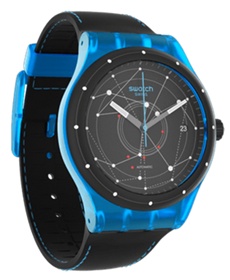Swatch smartwatch to take on Apple Watch
09 Feb 2015
Switzerland's Swatch SA, which makes trendy plastic watches that helped save the country's watch industry from cheaper Japanese quartz watches, is posing a formidable challenge to the Apple Watch, en.yibada.com reported.
 In its battle against Apple, Swatch can deploy a large number or patents and advanced technology, including the thinnest watch battery made.
In its battle against Apple, Swatch can deploy a large number or patents and advanced technology, including the thinnest watch battery made.
It has plans for the launch of a smartwatch in the next three months or a month after the Apple Watch debuted in April. No name for the Swatch smartwatch has been announced, though.
The internet-connected timepiece from Swatch would run Android and Windows software and it would allow users to make mobile payments like Apple Watch, Bloomberg noted.
Migros and Coop Cooperative, Switzerland's two largest retailers, would permit customers to make payments with Swatch's smartwatch and more retailers would be added.
According to CEO Nick Hayek, some of the Swatch timepieces to be launched this year would have technology derived from the record number of patent applications Swatch filed in 2014.
Among these is a powerful battery made of performance boosting materials. The battery is so thin that it could actually be bent but not break. Furthermore, the battery would not need recharging ever, according to Mashable.
Meanwhile, The Independent reported that universities across the country were moving to ban the wearing of watches to exams in case they were smart watches, according to reports.
With the Apple Watch set to release in April, which is expected to lead to surging interest in smart watches, invigilators wanted to be sure that students would not be able to use their watches to secretly access the internet or to look up information.
The University of London had said in summer that there had been two reports of the use of smart watches in its exams and though the Apple Watch would not be available until April, a range of companies already made the internet-enabled, wrist-worn computers - some of which looked much like normal, dumb watches.
According to the university, it would consider the issues and that responses could include banning smart watches entirely or guiding invigilators to recognise smart watches.


















